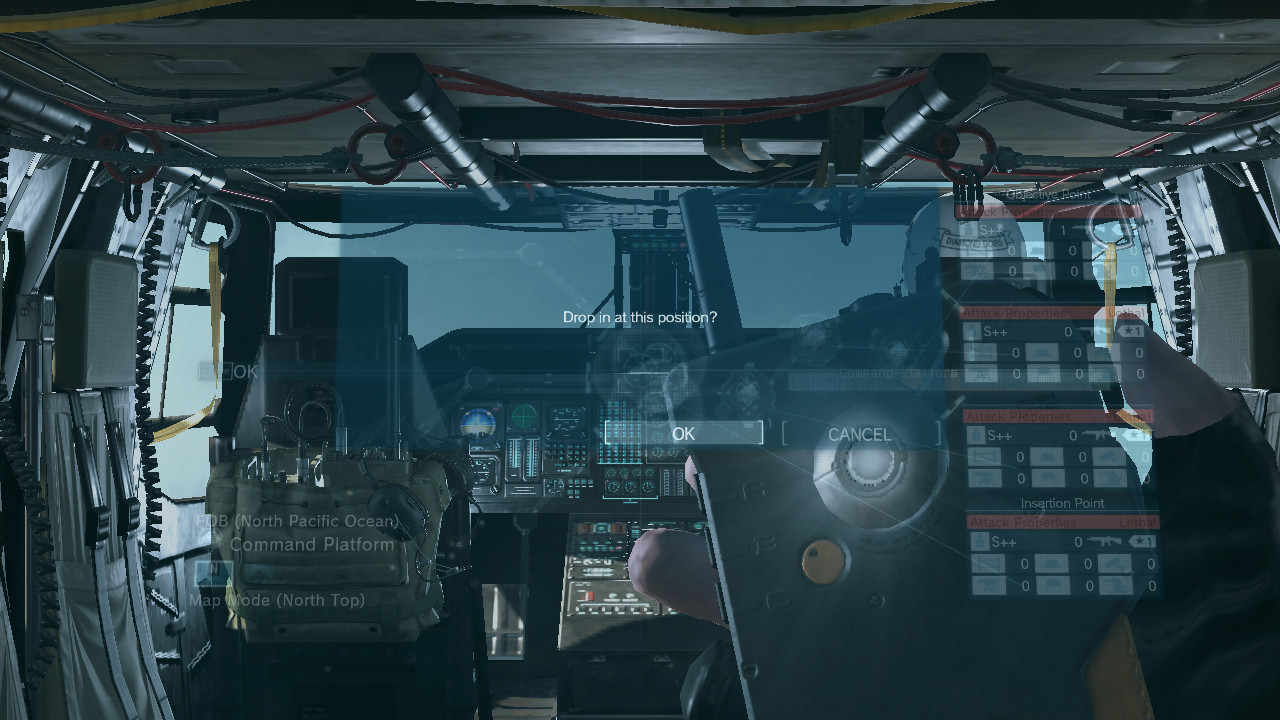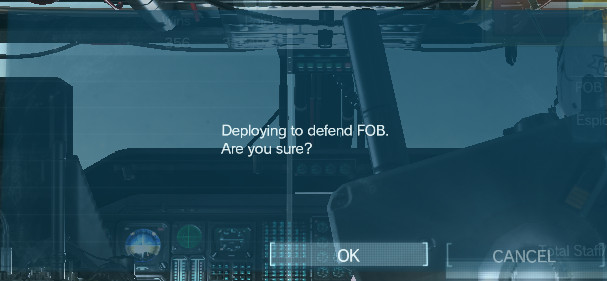Network
Contents
Contents:This page covers general network notes for multiplayer in TPP (FOB). Terms:
host- attacker player, the one who invades FOBclient- defender, joins host session to eliminate host
Exe information:
- version
1.0.15.3 - md5sum
7cc5f282b068f741adda2bb1076fb721 - Steam depot 287701, manifest
2518831260221836800
Network session
All network communications are performed in a context of network session represented by fox::nt::impl::SessionImpl2 class.
Host session
Host starts his session at LZ selection step (Drop at this position).

Stacktrace:
mgsvtpp.0000000143E55BA0 = fox::nt::impl::SessionImpl2::SessionImpl2
mgsvtpp.0000000143E5BC2C = fox::nt::Session::Create2
mgsvtpp.00000001459F3EBB = tpp::net::FobTarget::CreateHostSession
mgsvtpp.00000001416994CC = tpp::ui::menu::mbm::impl::FobMission2CallbackImpl::Update
Client session
Client starts his session after accepting deployment to FOB.

Stacktrace:
mgsvtpp.0000000143E55BA0 = fox::nt::impl::SessionImpl2::SessionImpl2
mgsvtpp.0000000143E5BC2C = fox::nt::Session::Create2
mgsvtpp.00000001459F39BF = tpp::net::FobTarget::CreateClientSession
mgsvtpp.0000000141697B79 = tpp::ui::menu::mbm::impl::FobMission2CallbackImpl::Update
Preparing connection
Preparation stage consists of:
- creating network socket
- starting session
- adding network members
- sending initial message
- notifying all session observers
It is covered by fox::nt::impl::SessionImpl2::PrepareP2pConnection.
Network socket
Game uses SteamNetworking API; Steam is referred to as FirstPartyP2pConnectionManager in code. All P2P data is send via UDP socket fox::nio::impl::SteamUdpSocketImpl, which appears to implement some unmentioned socket interface with most methods stubbed. Sockets are created in fox::nt::FirstPartyP2pConnectionManager::Impl::StartHostSession and fox::nt::FirstPartyP2pConnectionManager::Impl::StartClientSession.
Session observers
Session observers are objects are notified of some events. They are registered by calling fox::nt::impl::NetworkSystemImpl::AddSessionObserver. An example of such call can be found at 0x146845b7e, tpp::gm::impl::ScriptDeclVarsImpl::ScriptDeclVarsImpl, which serves as one of the session observers. They are created independently from online components; ScriptDeclVarsImpl one is added on every mission start.
Observers are notified in different places, such as fox::nt::Session::NotifyObservers and fox::nt::impl::SessionImpl2::PrepareP2pConnection. Notification is performed by calling observer’s OnSessionNotify method.
Establishing connection
Incoming connection is processed (host) by fox::nio::impl::SteamUdpSocketImpl::OnP2pSessionRequest, SteamAPI callback P2PSessionRequest_t. Connection request will be processed only if TppNetworkUtil.SessionEnableAccept(true) was called from lua beforehand (fox::nt::impl::SessionImpl2::EnableAccept under the hood). In game terms that means that host player must be already on FOB after using wormhole from helicopter.
Request contains steamID of the user who wants to start a P2P session with us; IP addresses are not known at that point. After accepting, Steam creates a connection between clients, traversing NATs when possible. At this stage you can inspect traffic in Wireshark using classicstun as a filter.
Initial message
Host sends inital message with value of 0x8b2228b2 (hashed string). This message is also sent in Update client/host loops, it’s significance is unknown.
Update loop
After establishing the connection game starts to periodically update network session by calling fox::nt::Member::SendUpdate (UDP packets, every 2 seconds).
At this point host player is already in the game and client is on sortie prep screen. No important data (player info, enemy status etc.) has been transferred yet.
After client player commences mission (triggering mission loading), session updates with state 4 for both players, triggering tpp::gm::impl::ScriptDeclVarsImpl::OnSessionNotify svars synchronization code. It is not clear where and when exactly it executes in relation to other mission loading code. Approximately at this point synchronizers also start working.
Synchronizers
Synchronizers are objects responsible for synchronizing various game states. They communicate using GameSockets (unlike SppSocket).
There are at least 12 implementations:
tpp::gm::cbox::impl::SynchronizerImpl
tpp::gm::corpse::impl::SynchronizerImpl
tpp::gm::example::impl::SynchronizerImpl
tpp::gm::gimmick::impl::ContainerSynchronizerImpl
tpp::gm::hostage::impl::Hostage2SynchronizerImpl
tpp::gm::impl::LadderSynchronizerImpl
tpp::gm::player::impl::SynchronizerImpl
tpp::gm::securitycamera::impl::SynchronizerImpl
tpp::gm::soldier::impl::Soldier2SynchronizerImpl
tpp::gm::uav::impl::SynchronizerImpl
tpp::gm::vehicle::impl::SynchronizerImpl
tpp::gm::walkergear::impl::SynchronizerImpl
There is also tpp::gm::impl::ScriptDeclVarsImpl, which is similar to synchronizers, but doesn’t belong to them.
Initialization on mission start, stacktrace:
mgsvtpp.00000001412A6C50 = tpp::gm::player::impl::SynchronizerImpl::Initialize
mgsvtpp.0000000146C6A6D6 = fox::CreateQuark
mgsvtpp.00000001409BCDD9 = tpp::gm::player::impl::Player2GameObjectImpl::AllocResourcesImpl
mgsvtpp.0000000146256915 = tpp::gm::player::impl::Player2GameObjectImpl::AllocResources
mgsvtpp.0000000146C93054 = fox::gm::impl::GameObjectImpl::Allocate
mgsvtpp.0000000146CC34C5 = fox::gm::impl::`anonymous_namespace'::GameObjectTypeCollector::AddObjectImpl
mgsvtpp.0000000146C93E79 = fox::gm::impl::CreateGameObjectImpl
mgsvtpp.0000000146C93977 = fox::gm::CreateGameObject
mgsvtpp.0000000146CC0E66 = fox::gm::impl::GameObjectDataBody::SetUpGameObject
mgsvtpp.0000000146CC0315 = fox::gamecore::GameObjectDataBody::Initialize
mgsvtpp.000000014327085D = fox::DataBody::ExecInitalize
mgsvtpp.000000014006E65E = fox::Block::Process
mgsvtpp.000000014314B095 = fox::impl::BlockHelperTask::Do
mgsvtpp.00000001400340AF = fox::TaskQueue::ExecuteTask
In that function 8 instances of Synchronizer are created by calling fox::gm::impl::'anonymous_namespace'::SynchronizationSystemImpl::CreateSynchronizer.
Ghidra code:
local_60 = 0x30;
local_68 = 3;
local_5c = 0x90;
local_58 = (uint *)CONCAT44(local_58._4_4_,1);
local_78[0] = 10;
local_64 = uVar2;
/* fox::gm::impl::`anonymous_namespace'::SynchronizationSystemImpl::CreateSynchronizer */
uVar7 = (**(code **)(*plVar5 + 8))(plVar5,local_78);
*(undefined8 *)(param_1 + 0x68) = uVar7;
cVar18 = (char)uVar3;
if ((cVar18 != '\0') && (uVar12 = uVar15, uVar3 = uVar15, uVar2 != 0)) {
do {
fVar19 = EQUIP_STATE_INTERVAL;
if (uVar12 == uVar3) {
fVar19 = SEC_PER_FRAME * 36000.0;
}
/* fox::gm::impl::`anonymous_namespace'::SynchronizerImpl::SetInterval */
(**(code **)(**(longlong **)(param_1 + 0x68) + 0x28))
(*(longlong **)(param_1 + 0x68),uVar3,uVar12 & 0xff,fVar19);
uVar12 = uVar12 + 1;
} while ((uVar12
}
Under the hood a GameSocketImpl is created, with id 0x30 (56) and count of 140 (0x90) (more on that later). Update interval is EQUIP_STATE_INTERVAL (equal to SEC_PER_FRAME, 0.016683333) (or SEC_PER_FRAME * 36000 = 0.016683333 * 36000 = 600.6).
GameSocket
GameSocket (fox::nt::impl::GameSocketImpl) is an abstraction used to mark all data sent from it with its id; mark is used to route received data into corresponding socket on the other side. GameSockets are created at various loading stages and not limited to synchronizers. All of them are initialized with unique ids and a count of.. something, probably peers? Count differs from one socket to another, from 1 to 140. Synchronizer-related GameSockets are active only after client starts the mission and cannot send/receive data before that for unknown reason.
Creating ScriptDeclVarsImpl socket, GVars (runs only on game start):
mgsvtpp.0000000143EA7840 = fox::nt::impl::GameSocketImpl::GameSocketImpl
mgsvtpp.0000000143EADA00 = fox::nt::impl::NetworkSystemImpl::CreateGameSocket
mgsvtpp.0000000140AE0DA0 = tpp::gm::impl::ScriptDeclVarsImpl::Create
mgsvtpp.0000000146847731 = tpp::gm::impl::DeclareGVars
ScriptDeclVarsImpl socket, SVars (on mission load):
mgsvtpp.0000000143EA7840 = fox::nt::impl::GameSocketImpl::GameSocketImpl
mgsvtpp.0000000143EADA00 = fox::nt::impl::NetworkSystemImpl::CreateGameSocket
mgsvtpp.0000000140AE0DA0 = tpp::gm::impl::ScriptDeclVarsImpl::Create
mgsvtpp.0000000146847D88 = tpp::gm::impl::DeclareSVars
mgsvtpp.000000014C1EF524 = luaD_precall
mgsvtpp.0000000141A2693B = lua::luaV_execute
mgsvtpp.000000014C1EF7BE = lua::luaD_rawrunprotected
mgsvtpp.000000014C1F0E72 = lua::lua_resume
mgsvtpp.0000000140A1CD08 = tpp::gm::impl::`anonymous_namespace'::SimpleMissionBlockController::InitializeForCreatingDataBodyInBlock
mgsvtpp.000000014006E39C = fox::Block::Process
Sockets (Game or Spp) are not required for transmitting data; you can use SteamUdpSocketImpl directly.
Sending data
GameSocketImpl
tpp::gm::impl::ScriptDeclVarsImpl::OnSessionNotify
fox::BitStreamWriter::PrimitiveWrite_ // --> writes svars into a buffer
fox::nt::impl::GameSocketImpl::RequestToSendToMember // with buffer as a parameter
fox::nt::impl::GameSocketImpl::Peer::RequestToSend
fox::nt::impl::GameSocketBufferImpl::Alloc
fox::nt::impl::TransceiverManagerImpl::Peer::AddToSendQueue
// after some time data is retrieved from SendQueue
fox::nt::impl::TransceiverManagerImpl::Peer::Send (0x143e7c130, with a loop)
fox::nio::impl::MpMuxImpl::GetTotalPayloadSize
fox::nt::impl::TransceiverManagerImpl::Peer::SendImpl
fox::nt::impl::GameSocketImpl::Peer::IsSendPacketEmpty
fox::nio::Buffer::Buffer(0x400)
fox::nt::impl::GameSocketImpl::Peer::CreateSendPacket
fox::nio::impl::MpSocketImpl::Send
fox::nio::impl::MpMuxImpl::Send
fox::nio::MpMessage::Create
fox::nio::MpMessage::Serializer::Serialize
fox::nio::MpMessageContainer::AddMessage
Game also tries to add another message into MpMessageContainer before sending it if there is enough space.
SppSocketImpl
mgsvtpp.000000014D36E92E = fox::nt::Daemon::UpdateLast
mgsvtpp.0000000143E729D4 = fox::nt::TotalController::Send
mgsvtpp.0000000143E73CBA = fox::nt::PeerController::Send
mgsvtpp.0000000143E6F99A = fox::nt::Member::SendUpdate
mgsvtpp.0000000141A5A75B = fox::nio::impl::MpMuxImpl::SendUpdate
mgsvtpp.000000014C397E48 = fox::nio::impl::SppSocketImpl::Send
mgsvtpp.0000000141A57FBA = fox::nio::impl::SppSocketImpl::SendImpl
mgsvtpp.000000014C4044F0 = fox::nio::impl::SteamUdpSocketImpl::Send
Receiving data
fox::nt::impl::TransceiverManagerImpl::UpdateToRecv handles incoming messages. Buffer is read by fox::nio::impl::MpSocketImpl::Recv.
Incoming data is processed differently based on first byte (questionable?):
- 0:
fox::nt::impl::TransceiverImpl::HandleMessage - everything else:
fox::nt::impl::GameSocketImpl::HandleMessage
All data is prefixed by some sort of header. An example for socket id 90: 18 28 3A 00 00 00 00 00 E9 B5 00.
Socket id is saved in B5 byte by fox::nt::impl::GameSocketImpl::Peer::CreateSendPacket. fox::BitStreamReader::PrimitiveWrite_ is responsible for encoding it, encoding is also dependent on current buffer position. Usually id can be recovered by shifting it to the right: 0xB5 >> 0x1.
E9 is added by fox::nio::MpMessage::Serializer::Serialize.
It is not known where 18 28 3A comes from. That value doesn’t change between game restarts and after sending more messages over that socket.
Packet dropping
Game keeps track of dropped packets and RTT (ping), entering limit state if these values are over predefined limits. Monitoring is performed by tpp::net::impl::BandWidthManagerImpl (created during in CreateHost/ClientSession). It is not clear what limit state does.
Limitations
There is a hard limit of about 1024 bytes in fox::nio::impl::MpMuxImpl::Send. If you attempt to send more data than that, message will be truncated to that limit (or won’t be sent at all?).
Increasing various buffers to get over that limit (MessageContainer, Serializer etc.) eventually causes a crash caused by calling memcpy at 0x141a5a0e9.
SteamAPI docs:
data is all sent via UDP, and thus send sizes are limited to 1200 bytes; after this, many routers will start dropping packets.
 MGSV Modding Wiki
MGSV Modding Wiki